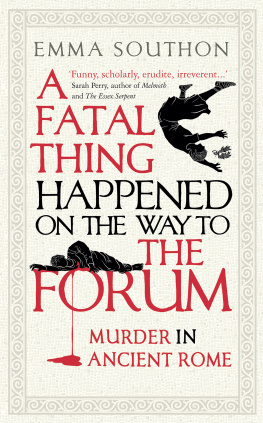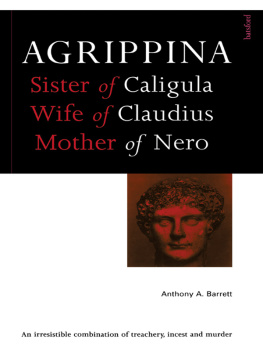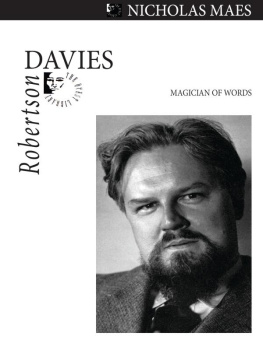Emma Southon - Agrippina
Here you can read online Emma Southon - Agrippina full text of the book (entire story) in english for free. Download pdf and epub, get meaning, cover and reviews about this ebook. publisher: Pegasus Books, genre: Non-fiction. Description of the work, (preface) as well as reviews are available. Best literature library LitArk.com created for fans of good reading and offers a wide selection of genres:
Romance novel
Science fiction
Adventure
Detective
Science
History
Home and family
Prose
Art
Politics
Computer
Non-fiction
Religion
Business
Children
Humor
Choose a favorite category and find really read worthwhile books. Enjoy immersion in the world of imagination, feel the emotions of the characters or learn something new for yourself, make an fascinating discovery.
- Book:Agrippina
- Author:
- Publisher:Pegasus Books
- Genre:
- Rating:3 / 5
- Favourites:Add to favourites
- Your mark:
- 60
- 1
- 2
- 3
- 4
- 5
Agrippina: summary, description and annotation
We offer to read an annotation, description, summary or preface (depends on what the author of the book "Agrippina" wrote himself). If you haven't found the necessary information about the book — write in the comments, we will try to find it.
Agrippina — read online for free the complete book (whole text) full work
Below is the text of the book, divided by pages. System saving the place of the last page read, allows you to conveniently read the book "Agrippina" online for free, without having to search again every time where you left off. Put a bookmark, and you can go to the page where you finished reading at any time.
Font size:
Interval:
Bookmark:

AGRIPPINA
THE MOST EXTRAORDINARY WOMAN
OF THE ROMAN WORLD
EMMA SOUTHON

PEGASUS BOOKS
NEW YORK LONDON
A GRIPPINA
Pegasus Books Ltd.
148 West 37th Street, 13th Floor
New York, NY 10018
Copyright 2019 by Emma Southon
First Pegasus Books hardcover edition August 2019
All rights reserved. No part of this book may be reproduced
in whole or in part without written permission from the publisher,
except by reviewers who may quote brief excerpts in connection with a review
in a newspaper, magazine, or electronic publication; nor may any part of this
book be reproduced, stored in a retrieval system, or transmitted in any form or
by any means electronic, mechanical, photocopying, recording, or
other, without written permission from the publisher.
Library of Congress Cataloging-in-Publication Data is available
ISBN: 978-1-64313-078-1
ISBN: 978-1-64313-182-5 (eBook)
Distributed by W. W. Norton & Company, Inc.
To all my Dificult Aunts
Dear Reader,
The book you are holding came about in a rather different way to most others. It was funded directly by readers through a new website: Unbound.
Unbound is the creation of three writers. We started the company because we believed there had to be a better deal for both writers and readers. On the Unbound website, authors share the ideas for the books they want to write directly with readers. If enough of you support the book by pledging for it in advance, we produce a beautifully bound special subscribers edition and distribute a regular edition and e-book wherever books are sold, in shops and online.
This new way of publishing is actually a very old idea (Samuel Johnson funded his dictionary this way). Were just using the internet to build each writer a network of patrons. Here, at the back of this book, youll find the names of all the people who made it happen.
Publishing in this way means readers are no longer just passive consumers of the books they buy, and authors are free to write the books they really want. They get a much fairer return too half the profits their books generate, rather than a tiny percentage of the cover price.
If youre not yet a subscriber, we hope that youll want to join our publishing revolution and have your name listed in one of our books in the future. To get you started, here is a 5 discount on your first pledge. Just visit unbound.com, make your pledge and type EMPRESS 18 in the promo code box when you check out.
Thank you for your support,
Dan, Justin and John
Founders, Unbound
Who gets to speak and why is the only question.
Chris Kraus
Contents
This is the story of an extraordinary woman. She is extraordinary because she saw the limits placed upon her by her world as a result of her gender and simply decided that they didnt apply to her. She saw clearly the spaces where women could not go, stormed into them anyway and was murdered as a result. This is the story of an empress, who was the sister, niece, wife and mother of emperors. It has incest and murder, wars and conquest, plots and prayers. It has a little of everything a good story should have because it is, importantly, a story.
Agrippina the Younger was born Julia Agrippina and lived from November 15CE to March 59CE. Her life spanned, and was intimately bound up in, the reigns of four of the first five Roman emperors Tiberius, Caligula, Claudius and Nero known as the Julio-Claudians. Which all sounds great for source material on her; after all, the Julio-Claudians appear to be pretty well covered in sources. Theyre the emperors everyone can name. Except that well covered in Roman terms generally just means more than one fragmentary source, and Agrippina is a woman in a world where women are considered to be staggeringly uninteresting, if not totally irrelevant. As a result, we have just three major literary sources that mention Agrippina with any detail, and a total of seven literary sources from the entire corpus of Latin literature that think she was interesting or significant enough to deserve a single line; one of which is a play.
The three big sources, with which you will become familiar over the course of the book, are Tacituss Annals, which is doomed to be defaced by sniggering Latin students for the rest of time, written around 116CE; Suetoniuss biographies of the emperors from Julius Caesar to Domitian, collectively known as The Twelve Caesars, from just a little later, about 121CE; and Cassius Dios Greek language, but culturally Roman, Roman History, from about 230CE. Conveniently, each of these slips into a different genre of Roman literature, but each has its own glaring, crippling problems when it comes to reconstructing the life of Agrippina. As you will have noticed for a start, each is published between 50 and 180 years after Agrippina died. Reading Tacitus therefore is, to us, essentially the same as reading a recently published history of the Second World War, while reading Dio is like reading a new history of the Georgians: they may be excellent but they are describing different times. Secondly, two of the sources are incomplete. Tacitus is a great read but was not very popular in his time so he survives in just two fragmentary manuscripts, the fragments of which do not overlap, so there are some big chunks missing, including the whole of Caligulas reign. This is a loss I shall never get over. The relevant books of Dio, on the other hand, are lost entirely and all that we have left are epitomes made by the much later writers Zonoaras and Xiphilinus, who cut down, paraphrased and supplemented Dios words for their own purposes. These are, in essence, fragments of Dios work and they are more fragmentary and confused than they appear when bound in a pretty translation. This leaves just Suetoniuss biographies, which would be fine if they were biographies of Agrippina; but theyre not. They are the biographies of the men that Agrippina was attached to. Suetonius is interested only in the motivations and actions of the subjects of his biographies and so the women in their lives, like our Agrippina, slip silently into the background to be brought out only when her presence could tell the reader something interesting about the more important man.
Trying to pry a Roman person, let alone a Roman woman, out of these fragmented, scattered sources is hard enough but, on top of the holes, the bits we do have are moralising in the extreme. Virtually the first thing that Tacitus tells us in his Annals is that he will write without malice or partisanship, a sweet promise this his history is merely the dispassionate recitation of objective facts. At the same time, though, he also tells us that he picks and chooses what to tell us about any given year because he believes that the historian has a duty to tell history that is moral and instructive: a historian should actively praise good behaviour and condemn wickedness. In the same sentence he tells us that the Julio-Claudian period of which he writes was a tainted and wicked age, which, although I strongly suspect that he did indeed believe this was a dispassionate and objective fact, is an opinion. Of course, the reader of Tacitus will have noticed that hes For the general reader, this is all the better as Tacitus is hilariously catty and tells a brilliant anecdote, as we shall see. For the historian or biographer, though, it is a pissing nightmare, because it means that every fact that Tacitus gives us is twisted and manipulated and carefully presented to tell a story that fits his overall narrative of moral decline and Roman degradation. And quite often, Tacituss narrative includes mind reading to make his story work. Within that narrative, Agrippina looms large as a symbol of everything that is wrong with the imperial system.
Font size:
Interval:
Bookmark:
Similar books «Agrippina»
Look at similar books to Agrippina. We have selected literature similar in name and meaning in the hope of providing readers with more options to find new, interesting, not yet read works.
Discussion, reviews of the book Agrippina and just readers' own opinions. Leave your comments, write what you think about the work, its meaning or the main characters. Specify what exactly you liked and what you didn't like, and why you think so.










